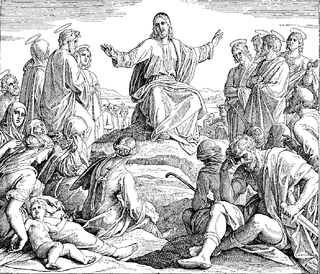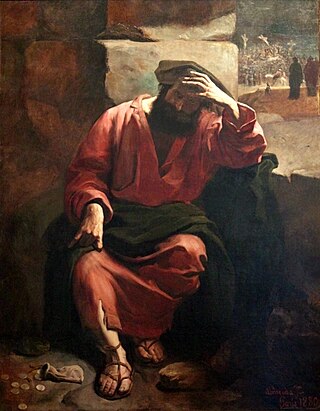
Matthew 4:12 is the twelfth verse of the fourth chapter of the Gospel of Matthew in the New Testament. The temptation scene has just ended, and this verse begins the introduction to the discussion of the Ministry of Jesus, which makes up the bulk of the gospel.

Matthew 4:18 is the eighteenth verse of the fourth chapter of the Gospel of Matthew in the New Testament. Jesus has just begun preaching in Galilee. In this verse he encounters the first of his disciples.

Matthew 5:1 and Matthew 5:2 are the first two verses of the fifth chapter of the Gospel of Matthew in the New Testament. The verses introduce the Sermon on the Mount that will be recited in the next several chapters. The previous chapter concluded with large crowds "from Galilee, and from the Decapolis, Jerusalem, Judea, and beyond the Jordan" who followed Jesus to witness him healing: these verses present Jesus as seeing the crowds and going up onto a mountain to begin teaching.

Matthew 5:23 and Matthew 5:24 are a pair of closely related verses in the fifth chapter of the Gospel of Matthew in the New Testament. They are part of the Sermon on the Mount. Jesus has just announced that anger leads to murder, and anger is just as bad as murder itself. And that whosoever is angry with his brother shall be in danger of the judgment himself. This verse states that resolving these disputes should take priority over religious rituals.

Matthew 5:26 is the twenty-sixth verse of the fifth chapter of the Gospel of Matthew in the New Testament and is part of the Sermon on the Mount. Jesus has just warned that if you do not reconcile with your enemies a judge is likely to throw you in jail. In this verse Jesus mentions that your debts must be paid completely before one can leave.

Matthew 5:43 is the forty-third verse of the fifth chapter of the Gospel of Matthew in the New Testament and is part of the Sermon on the Mount. This verse is the opening of the final antithesis, that on the commandment to "Love thy neighbour as thyself".

Matthew 7:21 is the twenty-first verse of the seventh chapter of the Gospel of Matthew in the New Testament and is part of the Sermon on the Mount. This verse continues Jesus' warning against false prophets.

Matthew 28:1 is the first verse of the twenty-eighth chapter of the Gospel of Matthew in the New Testament. This verse opens the resurrection narrative as Mary Magdalene and "the other Mary" visit Jesus' tomb after the crucifixion.

Matthew 28:3 is the third verse of the twenty-eighth chapter of the Gospel of Matthew in the New Testament. This verse is part of the resurrection narrative and describes the angel who arrived at the tomb of Jesus in the previous verse.

Matthew 28:4 is the fourth verse of the twenty-eighth chapter of the Gospel of Matthew in the New Testament. This verse is part of the resurrection narrative; describing the reaction of the tomb guards after the arrival of the angel of the Lord and the occurrence of an earthquake that opened the tomb.

Matthew 28:10 is the tenth verse of the twenty-eighth chapter in the Gospel of Matthew in the New Testament. This verse is part of the resurrection narrative. Having left the empty tomb, Mary Magdalene and "the other Mary" are on their way to meet the other disciples, when Jesus meets with them. In this verse the risen Jesus speaks with them.
Matthew 28:11 is the eleventh verse of the twenty-eighth chapter of the Gospel of Matthew in the New Testament. This verse is part of the resurrection narrative. In this verse some of the guards at the tomb return to Jerusalem to report to the chief priests.
Matthew 28:12 is the twelfth verse of the twenty-eighth chapter of the Gospel of Matthew in the New Testament. This verse is part of the resurrection narrative. In this verse the guards of the tomb, after being present for an angel hearkening the resurrection, are bribed by the priests to lie about what they saw.

Matthew 28:16 is the sixteenth verse of the twenty-eighth chapter of the Gospel of Matthew in the New Testament. This verse opens the final scene of the gospel, Jesus' resurrection appearance before his disciples in Galilee.

Matthew 10:1 is the first verse of the tenth chapter of the Gospel of Matthew in the New Testament. In this verse Jesus gathers his disciples and grants them healing powers in what is known as the commissioning the twelve apostles.

Matthew 27:11 is the eleventh verse of the twenty-seventh chapter of the Gospel of Matthew in the New Testament. This verse brings the narrative back to Pilate's Court, and the final trial of Jesus.

Matthew 27:5 is the fifth verse of the twenty-seventh chapter of the Gospel of Matthew in the New Testament. This verse continues the final story of Judas Iscariot. In the earlier verse Judas had regretted his decision to betray Jesus, but is met with disinterest from the Jewish leaders. In this verse his response is to return the blood money and then commit suicide.

Matthew 27:4 is the fourth verse of the twenty-seventh chapter of the Gospel of Matthew in the New Testament. This verse continues the final story of Judas Iscariot. In the previous verse, Judas had regretted his decision to betray Jesus. In this verse he returns to the Jewish leaders but finds no interest in his change of opinion.

Matthew 27:2 is the second verse of the twenty-seventh chapter of the twenty-seventh chapter of the Gospel of Matthew in the New Testament. Jesus has just seen condemned by the Jewish Sanhedrin, and in this verse is presented to Pontius Pilate.

Matthew 27:6 is the sixth verse of the twenty-seventh chapter of the Gospel of Matthew in the New Testament. This verse continues the final story of Judas Iscariot. In the previous verse Judas had cast into the temple the thirty pieces of silver he'd been paid for betraying Jesus. In this verse the priests discuss what to do with them.


















